Martin Edwards's Blog, page 46
February 22, 2023
Team Balliol's Reunion
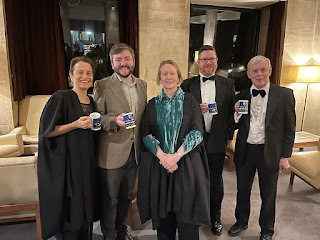
I've had a busy but hugely enjoyable few days with a number of highlights, including a quite unforgettable evening on Sunday when Dame Helen Ghosh, the Master of Balliol, hosted a celebration of Team Balliol becoming series champions in Christmas University Challenge. It really was special.
One of the quirks of the TV series is that there is no trophy for the winners - causing Jeremy Paxman to tell us we could however be unbearably smug 'until Twelfth Night' (although we noted that he didn't say in which year...) So the college supplied the deficiency, presenting each of us with commemorative mugs with a photo of the team, college crest, and appropriate legend. A fun souvenir of a great experience as well as of a marvellous evening back at Balliol.
It was great to see my lovely team-mates again - they are to be the dedicatees of Sepulchre Street, a small gesture of appreciation for their companionship and brilliance. The presentation was followed by a Fellows' Dinner. In accordance with a tradition going back to the days of the legendary Victorian Master of Balliol Benjamin Jowett, the Master and guests are greeted by a banging of spoons from the assembled diners - another experience that will stay in my mind! The dinner was followed by a concert by Simon Callaghan, a brilliant pianist.
After that, it was drinks in the Senior Common Room. Andrew, Martin and I kept going until 2 am - in truth, it was one of those nights we didn't want to end. The whole occasion had a lovely, almost surreal feel to it as I cast my mind back to my first visit to the college as a very, very nervous interviewee aged eighteen. It's hard to believe what has happened in the intervening years. Not even I would have dared to make it up...
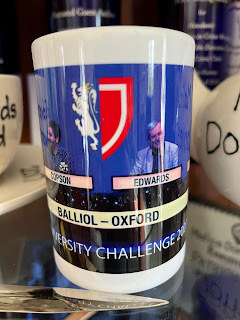
February 20, 2023
Literary Trails: Writers in their Landscapes - review
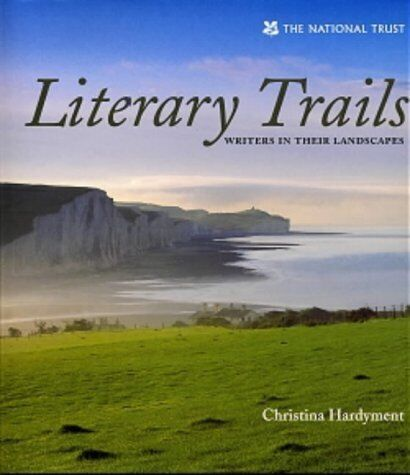
Some time ago I exchanged some pleasant correspondence with the writer and broadcaster Christina Hardyment, who is not a crime writer but has enjoyed a number of the E.C.R. Lorac reprints in the British Library's Crime Classics series. Among many other projects, Christina has written for the National Trust and for some weeks I've been dipping into a book of hers published by the National Trust back in 2000.
The first thing to be said is that, although it's not a new book, Literary Trails has aged well and remains a genuinely enjoyable read, offering a great deal of interesting as well as practical information about landscapes looked after by the National Trust. The sub-title is Writers in their Landscapes and the usual suspects - Austen, Kipling, Hardy, and du Maurier - are present and correct as well as some less obvious names. The text is supplemented by some gorgeous photographs and some archive pictures as well as, importantly, maps of the routes discussed. I have yet to follow one of the specific trails, but I'd have confidence in this guide.
The Lake District is well covered. To quote the dust jacket, you can 'discover where Wordsworth wandered "lonely as a cloud"...or take a voyage on Coniston Water with Arthur Ransome's Swallows and Amazons. My shameful confession is that, even though I've taken many boat trips on various other lakes in Cumbria, I've never actually sailed on Coniston and this book reminds me to repair that omission.
A very pleasing feature of this book which reflects Christina Hardyment's interest in detective fiction is the chapter 'The Scene of the Crime'. A number of other authors have covered this topic, and following This Deadly Isle I've been invited to do likewise, but I must say that, in a relatively short space, the author does a good job. Michael Gilbert's The Empty House is mentioned, as are W.J. Burley's Wycliffe novels and the non-series Charles and Elizabeth, which I reviewed on this blog recently. This is good-looking book but it's also very informative.
February 17, 2023
Forgotten Book - The Case of the Abominable Snowman
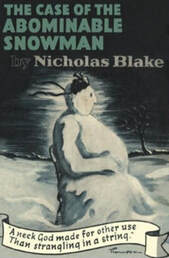
A publisher asked me recently to become involved with a Christmas writing project. This didn't work out, but the invitation inspired me to get round to reading a book I acquired last year. This is The Corpse in the Snowman, which is the American title for Nicholas Blake's The Case of the Abominable Snowman, a Christmas mystery set in war-time. The appeal of my copy lies in part in its inscription - to Blake's fellow poet, that very interesting character Laurie Lee, whose Cider with Rosie made quite an impression on me as a schoolboy.
But is the book itself any good? My answer is a definite yes. Since reading it, I've read one or two negative comments online but they are very much in the minority and simply reflect the truth that you can never please everyone. It's fair to say that the quality of Christmas mystery novels is variable, but this is one of the better ones, not just because of the calibre of the writing but also because the storyline is intriguing and the complicated plot is well constructed.
What I hadn't realised before reading the book was that it is a good example of the whowasdunin. We know from the start that a body has been discovered inside a snowman (ah, those were the days, when you could build a snowman and it would survive for ages). But what is the identity of the corpse? The answer is as well concealed as the victim.
This is a Nigel Strangeways mystery set during the war, which is no more than a background presence. The physical setting is a country house, to which Nigel is invited by an intriguing if rather strange old lady, to solve the puzzle of the bizarre behaviour of a cat. Matters take a turn for the worse when the naked body of a young woman is found. She has hanged herself - or has she? Strangeways soon becomes convinced that she is the victim of murder. The result is a book that I found consistently interesting.
February 15, 2023
The Third Secret - 1964 film review
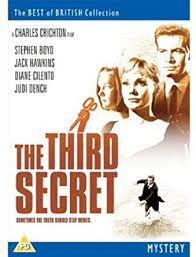
The Third Secret is an ambitious film that falls short of excellence but is nevertheless interesting. The basic plot material is quite straightforward; a famous psychiatrist dies, apparently having shot himself, but his daughter believes he was murdered. She persuades one of his patients (Alex Stedman, played by Stephen Boyd) to investigate. And it seems that it is one of the dead man's patients who was responsible for his death.
So far, so conventional. What took me by surprise was the way that Robert L. Joseph, who wrote and directed the film, opted for a storytelling approach that was wordy and at times pretentious. I think he could have achieved the effects he was aiming for in a more economical, less verbose way. That said, the script is unusual enough to keep the viewer interested, if at times irritated.
A real strength of the film is the cast. Whilst I don't think Boyd's performance is exceptional, Pamela Franklin is impressive as the dead man's daughter. The patients who come under suspicious include characters played by such notable actors as Richard Attenborough, Diane Cilento, and Jack Hawkins. The supporting cast, featuring Rachel Kempson, Peter Sallis, Peter Copley, Charles Lloyd Pack and even the young Judi Dench (in her first film role) is equally impressive.
If Joseph had edited his script more ruthlessly, and perhaps chosen another actor instead of Boyd role, this film could have been outstanding. It isn't, alas, but it's certainly worth watching. Joseph was aiming for a rounded psychological drama, I think, and this may account for his lack of concern about pace. But he did manage to produce an intriguing study of mental breakdown.
February 13, 2023
Playlist - 50 Hidden Gems by Burt Bacharach

There has been an outpouring of tributes to Burt Bacharach following his death last week, coming from everyone from Paul McCartney, Carole King, and Andrew Lloyd Webber to Noel and Liam Gallagher and Richard Coles, crime writer and ex-Communard. There have also been plenty of attempts at 'best of' playlists, but although Burt wrote a huge number of hits, I've always been struck by how many great songs of his remain more or less unknown. Of course, there were some terrible songs (the 'teenage death song' Two Hour Honeymoon, the theme song to Love in a Goldfish Bowl, Dick Van Dyke's One Part Dog, Nine Parts Cat, and Take Me to Your Ladder, about very tall female aliens living on the moon, to name but four) but there are many hidden gems.
So just as I like reviving obscure classic crime stories, here are some songs that I enjoy which I think will be mostly unfamiliar - but are definitely worth a listen. I've picked 50, but I could have picked plenty of others, not least Three Wheels on My Wagon!
The Beginning of Loneliness - Dionne Warwick
I have to start with Dionne and a song that begins quietly before building to high drama. And it has that touch of drama that I love in his best songs.
Where Did the Time Go - The Pointer Sisters
Obscure and melancholic but a lovely song
The Bells of St Augustine - Daniel Tashian
A recent song from the Grammy-nominated Blue Umbrella album
Falling Out of Love - Aretha Franklin
The Queen of Soul at her best
Why isn't this great song better known?
Theme song to a fun movie
Strange and untypical but striking - written for a film of the same name
Long After Tonight is All Over - Jimmy Radcliffe
Northern Soul classic, but not many people realise Burt wrote it
Checkout Time - Dionne Warwick
Wonderfully compelling melody, who else could write it?
Perfect Lovers - Ray Parker Jr
Co-written by Ray and Carole Bayer Sager
Welcome to My World - Andrew Mueller
From the musical 'Some Lovers'
Rain from the Skies - Delroy Wilson
A reggae version of an early song - and it works amazingly well.
What Am I Doing Here? - Liz Callaway
Gorgeous melody, inexplicably cut out of Promises, Promises
Long Ago Tomorrow - B.J. Thomas
A film theme song, but very different from 'Raindrops...'
Don't Count the Days - Marilyn Michaels
Unknown but classy mid-60s melodrama
And Then You Know What He Did - Dionne Warwick
A 'lost' song of astonishing complexity
Seconds - Gladys Knight and the Pips
Lyric by the famed playwright Neil Simon
Heartbreak Storms - Daniel Tashian and Burt Bacharach
Released last year, one of his last songs, and a very good one
From the soundtrack to Arthur.
Theme from the cult sci-fi movie, co-written with Hal David's brother Mack
Fairly recent but in the classic style
A 2017 makeover for a minor Walker Brothers hit first recorded by Gene McDaniels
Living on Plastic - Stephanie Mills
Written for Dionne before Burt split up with her and Hal David
One of Burt's last music videos
A film song that was much better than the film
Leave it to the Girls - Tomi Malm
A Finnish singer's recent version
New York, I Love You - Emma Hunton et al
Lyric by Steven Sater - very far from typical Bacharach and yet there are moments...
Riverboat - Libby Titus and Burt Bacharach
From the fascinating but under-estimated 'Woman' album
Something That Was Beautiful - Mario Biondi
Another Sater lyric, here with a great melody
Lyric by Tim Rice, from the film 'Stuart Little'
Obsession - Desmond Child and Marie Vidal
Obscure but undeservedly so
Pleasing title track from her album
Another 'lost' song, one of several co-written by Bobby Russell
Everybody's Out of Town - B J Thomas
A 1970 song that might have been written for lockdown...
A fascinating one-off collaboration
Easy to Love Again - Carole Bayer Sager
From the album Carole made with Burt when their relationship began
My Rock and Foundation - Peggy Lee
Unknown, but pretty good
Every Other Hour (Come Ogni Ora) - Karima and Mario Biondi
Terrific live version of a song from the musical Some Lovers
If I Could Go Back - Alfie Boe
The best song written for Lost Horizon - bizarrely cut out of the film
I Live in the Woods - Carly Simon and Burt Bacharach
A strange song by great songwriters
Who Gets the Guy? - Dionne Warwick
A quintessential Bacharach melody
The Love Too Good to Last - Phyllis Hyman
Good example of his 80s songwriting
What's Her Name Today? - Elvis Costello and Burt Bacharach
A very dark song
The title song from the movie musical - very good, just deserved a better film
Lyric by Paul Anka, from the forgettable film Together
From the soundtrack of Night Shift
After the Fox - Peter Sellers and The Hollies
A crazy song for a crazy film
Hearts Don't Lie - Joana Zimmer
Again highly obscure but classic modernish Bacharach
Two Hearts - Earth, Wind and Fire
A good collaboration
Go Ask Shakespeare - Rufus Wainwright and Burt Bacharach
A shorter version of the track from the great album At This Time
And believe me, there are plenty more good ones out there...
February 9, 2023
Burt Bacharach R.I.P.

As anyone who knows me well is aware, I've been a huge fan of Burt Bacharach since my teens and so it's inevitable that the news of his death at the grand age of 94 has saddened me. But my over-riding emotion is one of gratitude for all the happiness that his music has given me for so long. I first came across him by accident one evening, watching a TV special called 'An Evening with Burt Bacharach' when I was fourteen. I was amazed to find that so many of the songs I loved had been written by the same man. And I also found his obsessive passion for his work - whether writing, playing the piano, or conducting - enthralling. Equally obsessive, I set about finding every song he'd written, every scrap of information I could find.
If ever I was depressed or stressed through studying for exams, playing his music was astonishingly therapeutic - and I continue to find that it does me a power of good in any times of trouble. In those days, to be an unapologetic and evangelistic Bacharach obsessive exposed me to a degree of mockery from the fashionable kids who favoured prog rock bands. It was water off a duck's back - I couldn't care less about fashion or being trendy. I'd already learned that you have to be true to what you care about, whatever other people think or say.
When I sat my Oxford University entrance exam and was confronted by a question asking me simply to write about the twentieth century's greatest composer, I knew exactly what to write. When I was interviewed for a place at Balliol, to study law, things didn't go well at first. I felt completely overawed. Then one of the three tutors said in a rather baffled tone: 'You're the chap who wrote the essay about Burt Bacharach, aren't you?' 'That's me.' 'I thought you padded the essay with rather a lot of song titles,' he said. 'He's written a lot of very good songs', I retorted. 'I was making a case. Like an advocate does.' From that moment on, we got on extremely well and I duly became a Balliol man. Not entirely thanks to Burt, but he made a contribution!
When I started to write novels, I decided to feature a Bacharach reference in each one. Sometimes there were several. 'The Look of Love' is one of those in the first book, All the Lonely People, and after I took my agent Mandy to watch his musical Promises, Promises, I featured a fictitious performance in The Devil in Disguise. There are even Bacharach references smuggled into The Golden Age of Murder and The Life of Crime. This was my way of acknowledging all the pleasure his work has brought me. The forthcoming Rachel Savernake book, Sepulchre Street, may be set in 1931 but it still has plenty of Bacharach stuff in it, albeit in disguise.
At one point, I thought about writing a book about him.I talked to an editor about the idea and as a first step I interviewed Johnny Hamp, the TV producer who gave Burt his first major TV break with The Bacharach Sound and whose reminscences were fascinating. But I realised I couldn't do the job as well as it needed to be done, so I gave up. I rather wish the ghost writer of Burt's autobiography Anyone Who Had a Heart had realised the same thing. The 1996 TV documentary was far better.
On one occasion, my firm sponsored a classical concert at the Royal Liverpool Philharmonic and at dinner afterwards I had the pleasure of sitting next to the great conductor Vasily Petrenko. One of my partners cheekily (if unwisely) bet me that I couldn't work Burt Bacharach into the conversation. So I asked Vasily if he ever conducted while playing the piano. 'Too difficult,' he said. When I said Burt does it, Vasily grinned and said, 'He is a real maestro!'
The first LP I ever bought was Burt's Portrait in Music - decades later it was featured on the cover of the first Oasis album, Definitely Maybe. When the great man enjoyed a long overdue revival of popularity in 1996, I was present at that memorable night at the Royal Festival Hall when he played with Noel Gallagher. Each time he returned to Britain, I was there in the audience, watching him perform alongside and having his songs sung by the likes of Bob Geldof, Elvis Costello, Paul Carrack, Justin Hayward, Alfie Boe, Melody Federer, Yazz, Will Young, and many more - including, of course, his greatest interpreter, Dionne Warwick. Standing ovations time and again.

Burt Bacharach's name is rightly associated most closely with that great lyricist Hal David, but his collaborators include Bob Hilliard, Carly Simon, Elvis Costello, Brian Wilson, Neil Simon, Daniel Tashian, John Bettis, Tim Rice, Carole Bayer Sager, David Foster, Sally Stevens, James Kavanaugh, Neil Diamond, Anthony Newley, Norman Gimbel, Diane Warren, Cathy Dennis, Dr Dre, and many more. I had the pleasure of meeting his lyricist Steven Sater when I saw their new musical Some Lovers Diane Warren has just described as the Beethoven of the songwriting world, and it was Burt's performances of Beethoven and Rhapsody in Blue in a couple of those early TV specials that helped me to discover the joys of classical music.
I'm so glad I saw Burt on his last tour, back in 2019, when he performed with Joss Stone. That evening I met up again with some of the friends I've made who are fellow Bacharach enthusiasts, notably Davide Bonori (who some years ago got Burt to let me have his autograph) and Roberto Pinardi, who has compiled a fantastic 4 CD set of the instrumentals. Here we are, outside the Hammersmith Apollo on a wonderful sunny evening - one of the many magic moments I associate with the man who actually wrote Magic Moments. That night, Burt was on stage non-stop for just over two hours, playing piano, conducting, even singing (not his forte, but in his younger days the 'rumpled baritone' had an indefinable appeal). His stamina was extraordinary. And he was 91 years old...

One of the things I find inspiring about Burt Bacharach is that he kept his creative fire burning to the end of his life. He was nominated for two Grammys after passing the age of 90 - absolutely incredible. His last music video, released less than a year ago is charming. Maybe it was his last public performance; if so, a suitably poignant note to end on.
Since my books often feature death, naturally I think about it from time to time. I long ago came to the conclusion that since everyone dies, what really matters is what one achieves in life, not how that life ends. I've spent more than fifty years looking forward to the next new Burt Bacharach song. Now there will be no more - although happily, some of his previously unreleased work with Elvis Costello is due to come out next month - but I'm hugely thankful for the endless pleasure he's given me. Without his music my life would have been significantly less joyful. And his catalogue is so extraordinary, extensive, and eclectic that there''ll always be something there to remind me.
February 8, 2023
Happy Valley - series 3 review

I loved the first series of Happy Valley, which I more than once back in 2014. I enjoyed series two as well, and the third and final series more than matched the high standards set by the first two. There are plenty of good TV cop series around - I have a very soft spot for Endeavour, for instance - but Happy Valley is the best I've seen for many years.
This success is due to a great blend of people, place, and plot. Sally Wainwright's characters are superbly characterised and the story is great. The locations around Hebden Bridge, a town I love visiting, are highly evocative (not far away to the north, by the way, is my imaginary Blackstone Fell!). And the acting is brilliant. Sarah Lancashire wins many deserved plaudits as the tough but very human cop Catherine Cawood. James Norton, an actor with a very impressive range (yes, he would make a great James Bond), is superb as the bad guy Tommy Lee Royce. And Siobhan Finneran is, as usual, terrific as Catherine's dozy but somehow loveable sister. The supporting cast, which includes George Costigan, Amit Shah, Con O'Neill and Vincent Franklin, is consistently excellent.
In some ways the storyline boils down to an intense battle between Good and Evil - Catherine versus Tommy. In the six episodes of this series, we only saw the two of them together in a climactic scene. It was a very good scene, even if one or two lines did remind us a little too forcibly that Sally Wainwright learned her craft writing soap operas. But the important thing that she learned from working on Coronation Street and so on was the art of telling stories about believable people.
And, as I wrote nine years ago, she isn't afraid to give even a vile killer some redeeming qualities. She writes in a powerful but very accessible way - not an easy trick to pull off, but she makes it seem effortless. A remarkable achievement. Even before this series was screened, I mentioned Happy Valley in The Life of Crime as one of the best TV cop shows. After series three, I'm inclined to put it at the very top of the list.
February 6, 2023
Fear and Clothing by Jane Custance Baker
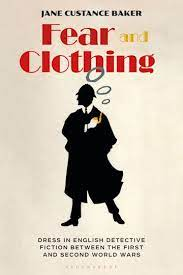
As anyone who has read The Life of Crime will appreciate, I'm not an academic but I do have a long-standing interest in academic writing about the genre and I'm very keen to support those who seek to bridge the gap between academic studies of crime fiction and the general reader. Too often over the years, career academics have produced books which are hopelessly unreadable as well as absurdly priced. However, there are now plenty of examples of academics writing interestingly and entertainingly about the genre, even if price often remains a major stumbling block. I've highlighted David Bordwell's Perplexing Plots recently as a truly outstanding example of how to do it. Lately, I've had the pleasure of corresponding with Lawrence Friedman, an emeritus professor of law at Stanford University in California, who is a lawyer, crime novelist, and writer about crime fiction and I've just started reading his articles about the genre, again written in a pleasingly readable style.
A new scholastic study published by Bloomsbury Visual Arts is a good example of how to write an appealing book about a less than obvious field of study. This is Fear and Clothing (great title!) by Jane Custance Baker. The sub-title is explanatory if less enticing: Dress in English Detective Fiction between the First and Second World Wars. You might not think that this topic justifies a full-length book - but it does so, and without padding. (And of course many readers of this blog will already be aware of Moira Redmond's excellent blog Clothes in Books, which addresses a wide-range of fashion statements in mystery fiction. If you don't know it, do take a look.)
I must admit that I'm not deeply interested in clothes or in fashion. But when writing the Rachel Savernake novels I've had to do quite a lot of research into what people wore in the early 1930s, because I do try to get small details right (an example is a version of the 'skeleton dress' worn by Rachel in the soon-to-be-published Sepulchre Street). I've consulted Moira on occasion and some of the points made in Fear and Clothing will, I feel sure, be very useful reference points for me in the future.
The author has read quite widely in the genre, so in addition to the usual suspects, I was pleased to find mention of books by the likes of R.A.J. Walling, Joanna Cannan, Belton Cobb, Alice Campbell, and Valentine Williams. Excellent - some books of this kind suggest that the authors have only read the famous writers of the past, and then with only limited excitement, but that is definitely not the case here. On the whole, the writing is accessible and lively, with relatively few digressions into academic-speak (though, to take one example, 'hegemonic' is a word that I felt crops up an excessive number of times in a short space).
All writers make mistakes, but there are quite a few unforced errors in this book that could easily have been avoided with stronger editing, including a revival of the idea that the Detection Club was founded in 1928 rather than 1930. The number of errors in the spelling of names of authors and characters (e.g. Christianna Brand, Anthony Berkeley, Francis Iles, Gladys Mitchell, Dorothy Bowers, Honoria Waynflete) was disconcerting. Then again, I've made enough mistakes of my own over the years to believe that what really matters is whether a book like this works as a whole. And I think it does, making it a useful and quite unusual contribution to our understanding of Golden Age fiction. So it is definitely of interest. Alas, it's an expensive book, presumably because it's aimed at the academic library market, but of course the author has no say in pricing - it's an issue determined by the publishers.
February 3, 2023
Forgotten Book - Charles and Elizabeth
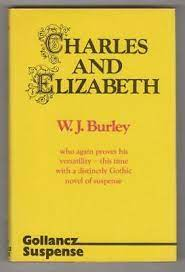
The name of W.J. Burley is inextricably linked with that of his series character, Superintendent Charles Wycliffe, who was portrayed by Jack Shepherd (not entirely to Burley's delight) in the eponymous TV series about the Cornish cop. It's less well-known that he wrote a variety of other novels. Two of them were classic detective novels, featuring Henry Pym, and one was a sci-fic novel, The 6th Day. There were also some stand-alones, and these include Charles and Elizabeth, published in 1979.
Charles and Elizabeth is an obscure book. I don't think it was ever paperbacked in Britain, and I've never seen it discussed anywhere. I referred to it in an article I wrote for Mystery Scene years ago, but that was before I read it. That article, by the way, was adapted for inclusion on a Burley tribute website established by Mario de Pace. I had an interesting correspondence with Mario at the time, and he featured extracts from Burley's 'plot books' on the site. Sadly, the site is no longer extant. On looking into the matter, I was sorry to find that Mario died seven years ago. The loss of the website does mean that there's a dearth of interesting material on the web concerning Burley - a shame.
It's clear that Burley was pleased with this book, and I can see why. He must have been really frustrated that it didn't make more of an impact. It isn't a detective story in any conventional sense, although one might argue that the narrator, Brian Kenyon, undertakes an investigation into the past, trying to uncover the truth about the title characters.
This book was correctly described by Gollancz, the publishers, as 'a distinctly Gothic novel of suspense' I don't want to say too much about the story, but in a nutshell Brian (a teacher, like Burley) finds himself able to access the life of Charles Bottrell, a young man from a rich family who lived in Cornwall in the 1860s. Charles disappeared in mysterious circumstances - was he murdered? At first I wasn't sure I was going to enjoy the story, but Burley's concise, unflashy, Simenonesque style, suits the strange material.
The sections set in the past start to merge with those in the present - personally, I'd have included section breaks, but I'm sure Burley's decision was a conscious one, though it's slightly confusing. Before long I found myself gripped. This is a short, fascinating book that doesn't deserve to be forgotten. Had I written it, I'd have ended the story differently but again it's clear that Burley was working to a particular design and his conclusion does have some merit. I suspect that the real problem was that this novel came out at a time when stories of this type were not terribly fashionable. But it was a good book in 1979 and it is still a good book.
February 1, 2023
Stowaway - 2022 film review
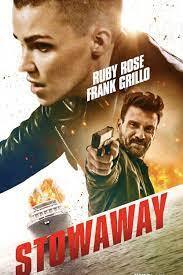
There's more than one film called Stowaway, but this post is about the recent movie previously called, perhaps even more unimaginatively, The Yacht. Stowaway is a film that begins slowly, but improves and features moments of genuine tension. These aren't really enough to make it a great film, but it's perfectly watchable.
The film begins, in effect, with a few flashback scenes. As a child, Bella Denton (Ruby Rose) was devoted to her father, but he deserted her years ago, for reasons that aren't clear. She grew up into a wild child, but in the here and now a surprise awaits her. A chum of her Dad's tells her that she has inherited from him a very posh yacht called the Bella.
She isn't allowed to stay on the yacht overnight, it seems, until certain mysterious legal technicalities are sorted out. But she does so anyway, in the company of a young guy she picks up in a bar. Unfortunately, while they are in bed, the Bella is hijacked by a couple of armed men, who have hired the captain of the boat for some nefarious purpose.
All too soon, Bella finds herself trapped on the open sea with a pair of ruthless killers. Can she escape or get help before they find her? The cat and mouse scenes are pretty good, but I didn't warm to Bella as much as I should have done for maximum enjoyment. The script isn't terrible, but I did feel it could have been sharper and less uneven. It does baffle me why so many films which have some merit seem to skimp on the writing.



